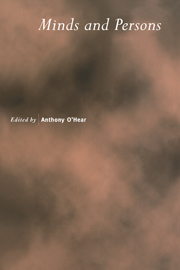Book contents
- Frontmatter
- Contents
- Preface
- Notes on Contributors
- Perceptual, Reflective and Affective Consciousness as Existence?
- The Domain of Folk Psychology
- Minds, Persons and the Unthinkable
- Moderately Massive Modularity
- A Theory of Phenomenal Concepts
- Free Will and the Burden of Proof
- Materialism and the First Person
- Language, Belief and Human Beings
- Human Minds
- Non-Personal Minds
- Personal Agency
- Mental Substances
- Mind and Illusion
- Index
Personal Agency
Published online by Cambridge University Press: 04 August 2010
- Frontmatter
- Contents
- Preface
- Notes on Contributors
- Perceptual, Reflective and Affective Consciousness as Existence?
- The Domain of Folk Psychology
- Minds, Persons and the Unthinkable
- Moderately Massive Modularity
- A Theory of Phenomenal Concepts
- Free Will and the Burden of Proof
- Materialism and the First Person
- Language, Belief and Human Beings
- Human Minds
- Non-Personal Minds
- Personal Agency
- Mental Substances
- Mind and Illusion
- Index
Summary
Why does the problem of free will seem so intractable? I surmise that in large measure it does so because the free will debate, at least in its modern form, is conducted in terms of a mistaken approach to causality in general. At the heart of this approach is the assumption that all causation is fundamentally event causation. Of course, it is well-known that some philosophers of action want to invoke in addition an irreducible notion of agent causation, applicable only in the sphere of intelligent agency. But such a view is generally dismissed as incompatible with the naturalism that has now become orthodoxy amongst mainstream analytical philosophers of mind. What I want to argue is that substances, not events, are the primary relata of causal relations and that agent causation should properly be conceived of as a species of substance causation. I shall try to show that by thus reconceiving the nature of causation and of agency, the problem of free will can be made more tractable. I shall also argue for a contention that may seem even less plausible at first sight, namely, that such a view of agency is perfectly compatible with a volitionist theory of action.
Event causation and substance causation
First, let us focus on the distinction between event causation and substance causation—the latter term being, of course, one that is little in use at present.
- Type
- Chapter
- Information
- Minds and Persons , pp. 211 - 228Publisher: Cambridge University PressPrint publication year: 2003
- 4
- Cited by



